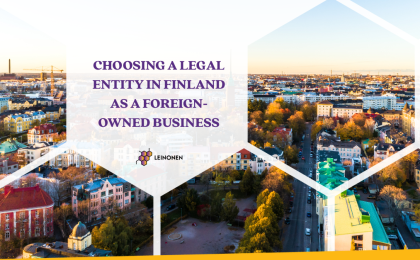With its low corporate tax rate and strong economy, Finland is an appealing location for many foreign-owned businesses looking to branch out in Europe. International companies are welcomed with open arms, and enjoy the same benefits and grants as Finnish companies.
In this article, Leinonen Finland will introduce you to the basics you need to know for success as a foreign-owned business in Finland.
Why set up Your Business in Finland?
Innovation thrives in Finland, and strong innovative skills generate business results. New businesses are continuously emerging in the gaming, electronics, software, cleantech, and health industries.
Finland also boasts one of the most competitive and open economies in the world. Like many Nordic countries, it is a European Union (EU) member state, but Finland is the only one of them to have adopted the euro.
Finland benefits from being one of the least corrupt countries in the world, too, and this is reflected in its business life. The judicial system is independent and impartial; in Finland, you can expect your case to be processed fairly and in accordance with the law. Companies appreciate Finland’s stable and transparent environment.
Company Establishment in Finland
When establishing a business in Finland, there are a few things that must be determined. The basics are the company’s name, field of activity, and company form (legal entity).
What Legal Entities can be Formed in Finland?
- Private entrepreneur (toiminimi)
- Limited company (osakeyhtiö)
- Partnership (avoin yhtiö)
- Limited partnership (kommandiittiyhtiö)
- Cooperative association (osuuskunta)
- Branch office/PE (sivuliike-kiinteä toimipaikka)
The following factors should be taken into account when choosing a legal entity:
- Number of founders
- Capital requirement
- Division of responsibility and decision making
- Financing and taxation
If you are unsure on which legal entity is the best fit for your foreign-owned business in Finland, consult with a Finnish tax expert for advice.
What is the Most Popular Legal Entity in Finland?
Limited company is the most popular legal entity in Finland. For this, at least one shareholder is needed, and the company must have one to five regular members in the board of directors. To set up a private limited liability company, no share capital is required. This makes it an accessible and attractive option for many local and foreign-owned businesses in Finland.
Tax in Finland
Corporate Income tax
For limited companies, the corporate income tax in Finland is 20%. This is uniform for all types of corporate income, including sales profits, interest income, dividends, royalties and rental income. Deductible expenses include any expenses linked to the generation of income (e.g., rents, salaries, and purchases for the business).
Personal Income tax
Personal income tax in Finland is progressive; the higher the income, the higher the tax rate (up to a maximum of 44.25% on qualifying gross income). Individuals must also contribute to pension insurance, health insurance, municipal tax, church tax, and unemployment insurance totalling 15.97% to 23.67%.
Note: Rates and regulations surrounding payroll, accounting and tax in Finland are constantly changing. Consult with an expert Finnish tax advisor to find out the latest changes affecting your business.
Accounting in Finland
Accounting Requirements
In Finland, only publicly traded companies are required to comply with IFRS standards. All other companies, partnerships, sole traders or professionals can adopt the local Finnish Accounting System. Provisions on accounting are laid down in the Accounting Act (1336/1997) and Accounting Decree (1339/1997).
Financial Information
The financial year in Finland is generally a calendar year (or another 12 month period). In the year of commencement, the financial year can be less or more than 12 months (up to a maximum of 18 months). Financial statements must be prepared within four months of the end of the financial year, and submitted to the Trade Register and tax authorities. The universal accounting principles of true and fair presentation and the material disclosure of information should be followed in all financial statements.
As per chapter three, section one of the Accounting Act (30.12.2015/1620), financial statements should contain the following:
- Balance sheet disclosing financial position at the balance sheet date
- Profit and loss account, disclosing how profit or loss has arisen
- Cash flow statement and its application, if the reporting entity is a large enterprise or a public interest entity
- Notes to the balance sheet, profit and loss account, and cash flow statement
The Finnish Accounting Act defines microbusinesses, small enterprises and large enterprises. Each have their own rules for financial statements. All operators other than sole traders and those offering a professional service must use the double entry method of accounting. If expenditure and revenue are recorded on cash basis, trade creditors and trade debtors must be identifiable at all times (30.12.2015/1620).
Financial statements must be kept for at least 10 years from the end of the financial period they correspond to, as per the Accounting Act. Other accounting materials such as invoices, vouchers, reconciliation reports, accounts receivable and human resource documents are to be retained for six years from the end of the financial year.
If you need support preparing financial statements, speak to a local expert on accounting in Finland.
Tax Liability
Some entity forms (e.g., limited liability companies), are independently liable to pay income tax. In Finland, the corporate income tax rate is 20%. Corporate entities must file their income tax returns electronically within four months of the end of the financial year. E-filing requires authentication with Finnish online banking codes or Katso identification, depending on the company type.
VAT in Finland
The general Value Added Tax (VAT) rate for goods and services in Finland is 25.5%. Reduced rates are applicable on certain goods and services.
14% VAT rate applies to goods and services including:
- Groceries
- Animal feed
- Restaurant services (not including supply or serving of alcoholic drinks, or supply of tobacco)
- Meal services
- Books
- Sanitary protection products and diapers
- Admittance to cultural, entertainment, or sports events
10% VAT rate applies to:
- Newspapers and magazines
- Public broadcasting
0% VAT rate applies to things like:
- Sales, rental, and chartering of vessels specified in the VAT Act (and work performed on them)
- Exports outside the EU
- Sales of goods within the EU to VAT-liable buyers
Are any Business Operations VAT Exempt?
Yes, some operations are exempt from VAT, including:
- Health and medical services
- Social services
- General education
- General postal services
Need Personalised Guidance? Find an Authorised Accounting Firm
The Association of Finnish Accounting Firms authorises accounting firms that comply with their guidelines for good practice, standards and tools. These firms are subject to regular inspections.
Of the 4000+ accounting firms offering accounting and payroll administration services in Finland, only around 800 have been authorised. One of them is Leinonen. For more details on products and services exempt from or subject to a lower rate of VAT, speak to a trusted Leinonen Finland accounting and tax professional.
Employment and Payroll in Finland
Finnish labour and occupational safety legislation is applicable to all employees working for Finnish employers, regardless of their nationality. In the case of ‘posted workers’, terms and conditions such as overtime, working hours, vacations, sick leave and minimum wage are in accordance with the applicable collective agreement.
Finland has signed tax treaties with various countries to prevent double taxation. Foreign nationals that work in Finland for more than 183 days, either over a period of 12 months or in the course of a calendar year are taxed in Finland.
Collective Agreements
In Finland, employment legislation creates the general framework of the terms and conditions of employment, but the unions of employers and employees enter into collective agreements that are more specific than the law.
Some of these agreements are universally binding. This means that even unaffiliated employers that do not belong to an employer’s organisation must apply the terms and conditions of the sector’s collective agreement. If the terms of an employment contract are not in accordance with a binding collective agreement, they are not legally valid. There are around 160 binding collective agreements in Finland.
Employer Obligations
In Finland, employers have a list of obligations. For example, they must:
- Observe the law and employment related contracts
- Treat employees equally regardless of their origin, religion, sex, age or political views
- Look after employees’ safety and occupational health
- Provide employees with a written description of the conditions of work
- Promote a good working environment
- Boost employees’ performance and contribute to their occupational development
- Provide preventative occupational health care, even if they only have one employee
- Have accident insurance covering their employees
- Pay fees related to employees’ pension insurance, unemployment insurances, group life insurance and social security
Offering medical care is voluntary, but regular health examinations must be arranged if the work involves special health risks. There are also some exemptions from the obligation to insure employees in Finland. Most of these are related to foreign employers and/or employees, and are therefore often relevant to foreign-owned businesses in Finland.
For example, if an employee is not covered by social security in Finland, their employer does not need to withhold the employee’s share for this. However, they must still ensure contributions are paid in the country where the employee is covered by social security. The Website of the Occupational Safety and Health Administration in Finland provides a thorough checklist of obligations for employers.
Holidays
The legal provisions concerning annual holidays can be found in the Annual Holiday Act, but there may be further provisions in the collective agreement. The accrual of holidays is calculated in accordance with the holiday credit year (April 1 to March 31).
If the employee has been working for less than a year on March 31, they are entitled to two weekdays of holiday for each full holiday credit month. Conversely, if they have been employed for at least a year by March 31, they are entitled to two and a half weekdays of holiday per full holiday credit month. A holiday credit month is defined as any calendar month during which an employee works at least 14 days or 35 hours.
Although there are no provisions regarding holiday bonuses in the Annual Holiday Act, it is common to pay a bonus (for example, a bonus of 50% of the holiday pay). Rules on holiday bonuses can be set out in a collective agreement.
Being an Expat in Finland
Citizens of EU member states, Nordic countries, Liechtenstein or Switzerland do not need a residence permit to stay in Finland. It is possible to reside and work freely in Finland for up to three months. If the stay is more than three months, the foreign national must register with the Finnish Immigration Service. A valid identity card or passport is needed for this.
All foreign nationals coming to Finland from outside the EU for more than 90 days must apply for a residence permit. Even if the stay is less than 90 days, a person may need a residence permit for working purposes. Residence permits must be applied for personally. Expats staying in Finland for longer than six months are considered resident taxpayers and are subject to unlimited tax liability. This means that their income is taxed progressively in the same way as that of people living in Finland permanently.
An A1 certificate specifies which country’s social security laws apply to a worker when working abroad. It also determines to which country social insurance contributions should be paid while they are working in Finland.
Give Your Foreign-owned Business in Finland a Strong Start With Leinonen
Helsinki is an impressively fast growing European city. With its ever-expanding and highly interesting consumer market, positive trends in economic development, population growth, and purchasing power, it is an incredibly attractive location for foreign investment. According to a projection by Statistics of Finland, the population of Helsinki will increase to almost 750,000 by 2030.
If you are ready to set up your foreign-owned business in Finland, Leinonen Finland’s experts are here to help with tailor made, high quality accounting, payroll, and tax services. Leinonen has been supporting cross-border businesses for over 34 years, helping over 100 clients register their foreign-owned businesses in Finland alone.
Contact Leinonen Finland today to organise a personalised consultation with one of our local experts on business and accounting in Finland.





